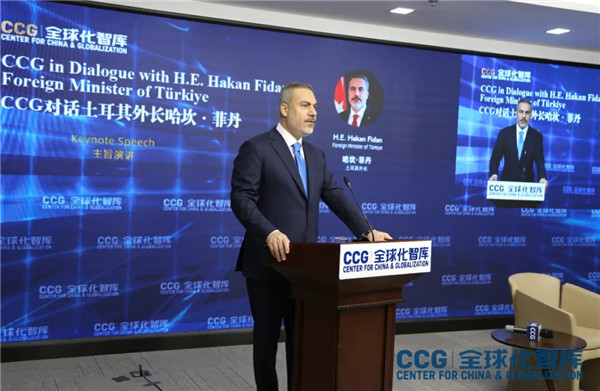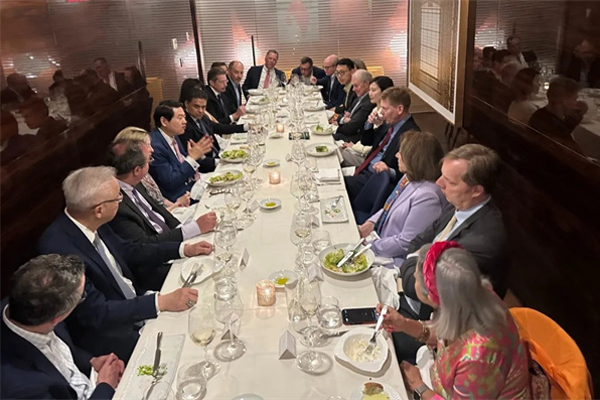Amidst trade tensions, CCG trip to the US of nearly 20 events over four days sets a landmark for Track II diplomacy work by an independent Chinese think tank
On September 29, CCG successfully completed its week-long series of Track II diplomacy activities in the US. This was the second such trip by CCG to the US since trade frictions escalated between the US and China.
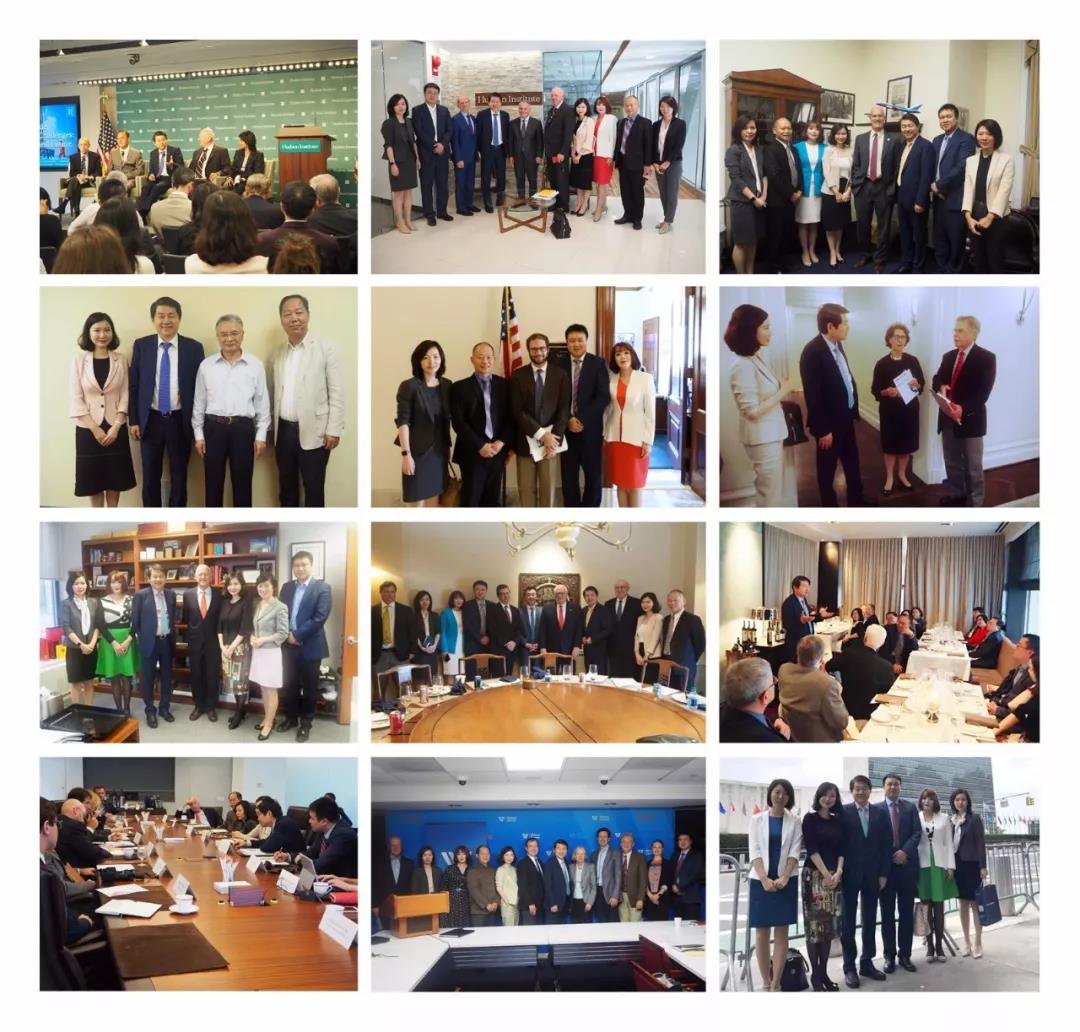
Through this series of activities, CCG sought to leverage the positive role that think tanks can play in helping to aid mutual understanding and harmonious bilateral relations, engaging in wide-ranging, in-depth exchanges with US think tanks, members of Congress, the US Department of State, representatives from the business community, the Chinese embassy to the US, and experts at the United Nations. This trip was particularly notable for CCG’s interaction with leading conservative think tanks and the release of a report to share Chinese perspectives with the US public and propose constructive recommendations on how to nurture positive economic relations between China and the US.
This year marks the 40th anniversary of China’s Reform and Opening-up policy and almost four decades of China-US relations. During this time, economic ties have served as a stabilizing ballast for China-US relations. As new US tariffs on Chinese goods went into effect and China published a white paper to clarify the facts about China-US economic and trade relations, an eight-strong delegation of CCG experts traveled to Washington and then New York, carrying out nearly 20 Track II diplomacy activities over four days. During this time, CCG engaged with leading figures from political parties, government, business and academia. CCG’s delegation held talks with nearly 100 people and engaged with over 300 event participants, a record for Track II diplomacy work by an independent Chinese think tank in the US.
During this trip, at The Hudson Institute in Washington, CCG launched its latest report on China-US relations, China-US Trade Relations, and Challenges: Past, Present, Future and Policy Options. This event marked the first time that a Chinese think tank had released research findings on the Sino-US economic relationship at a leading conservative think tank.
The CCG delegation for this US visit included CCG President Wang Huiyao; CCG Vice President Miao Lu; Dr. Wenshan Jia, CCG Senior Non-resident Fellow and Professor of Journalism, Renmin University of China; Li Weifeng, CCG Executive Secretary-General; Li Yeqing, CCG Non-Resident Senior Fellow and President of the America-China Society; Tang Beijie, CCG Deputy Secretary-General; Deng Xiwei, CCG Non-Resident Senior Fellow and Professor at the University of International Business and Economics; Xiao Huilin, CCG Senior Research Fellow; CCG Deputy Secretary-General Xu Haiyu; and Ma Hongxia, CCG Shanghai Secretary-General.
Review of CCG’s track II diplomacy activities in the US
Event 1: CCG holds discussions with The Wilson Center
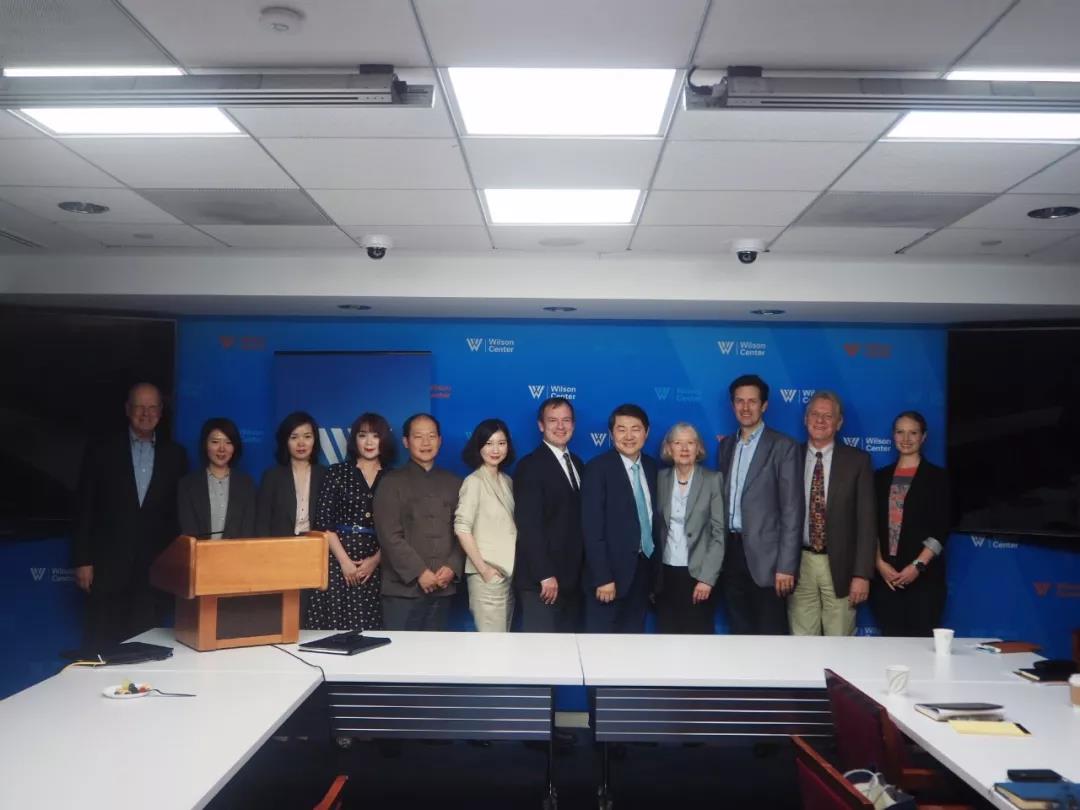
On September 25, CCG visited The Wilson Center to engage with US scholars. The meeting was chaired by Robert Daly, Director of the Wilson Center’s Kissinger Institute on China and the US. Other participants from The Wilson Center included Meg Lundsager, Wilson Center public policy fellow and former US executive director on the International Monetary Fund Executive Board (2007-2014); Douglas G. Spelman, senior fellow and former deputy director of the Kissinger Institute on China and the United States; Benjamin Creutzfeldt, resident fellow; Danielle Neighbour, Schwarzman fellow at the Kissinger Institute and China Environment Forum; and Katie Stallard-Blanchette, resident fellow.
Event 2: Return visit to the American Enterprise Institute
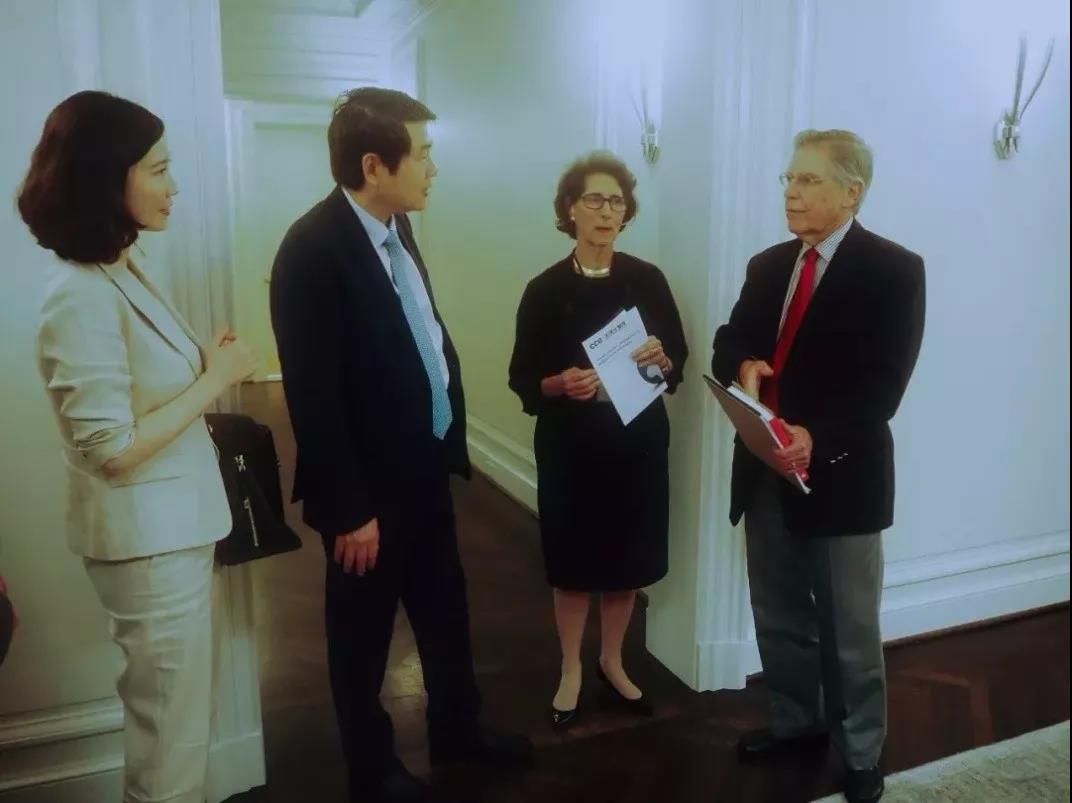
On the same day, CCG visited the American Enterprise Institute (AEI), an influential think tank for the Trump administration. CCG experts discussed a range of topics including the US-China trade war, tax reform, and upcoming midterm elections with familiar AEI counterparts that took part in a joint event last year with CCG, including Karlyn Bowman, senior fellow; and Peter J. Wallison, a co-director of AEI’s program on financial policy studies. This further engagement helped build a foundation for long-term cooperation between CCG and AEI.
Event 3: In-depth discussions with the Council on Foreign Relations (CFR)
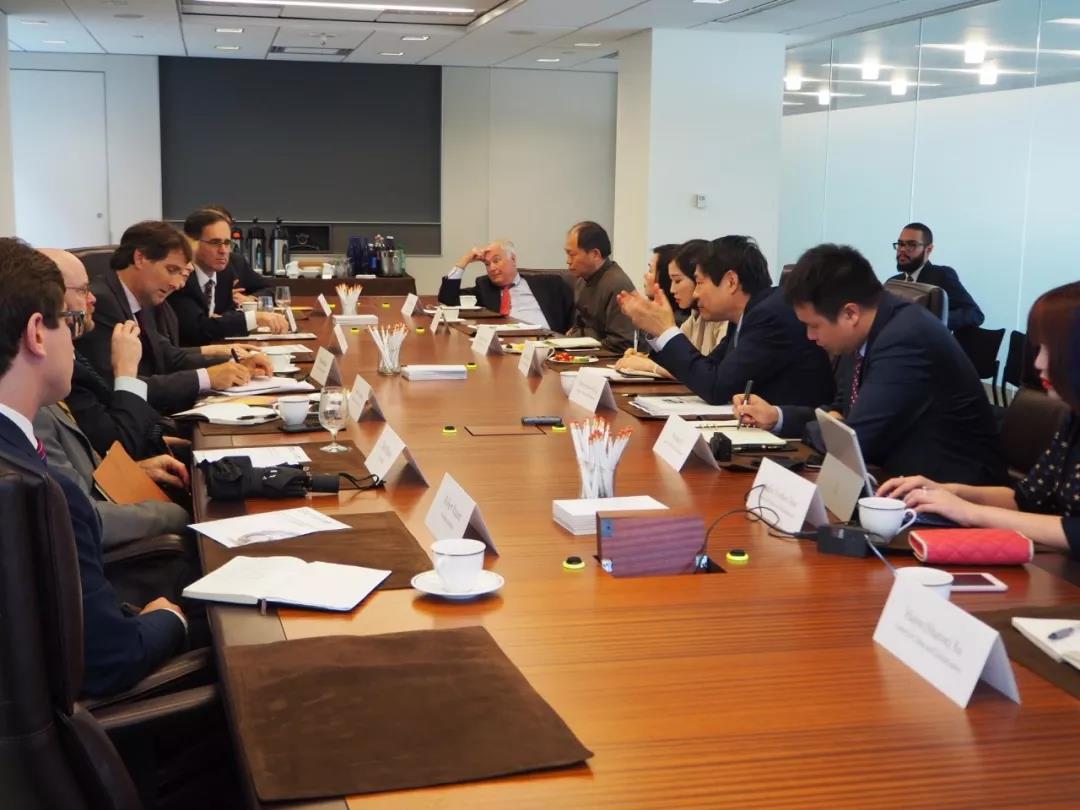
On September 25, CCG visited CFR to discuss topics including the trade war, global value chains, and multilateralism with CFR counterparts and US experts from key institutions. CFR is a leading think tank in Washington and particularly influential in foreign policy. The discussion was chaired by Bernard L. Schwartz, CFR senior fellow, and Edward Alden, also a CFR senior fellow. Other participants included Daniel Ikenson, director of Cato’s Herbert A. Stiefel Center for Trade Policy Studies; Robert B. Kahn, adjunct professorial lecturer at The American University; James M. Lindsay, CFR director of studies; Todd N. Tucker, fellow at the Roosevelt Institute; Robert Maxim, senior research analyst at Brookings; William A. Reinsch, Scholl Chair in International Business at CSIS; and Mary E. Lovely, nonresident senior fellow at the Peterson Institute.
Event 4: Visit to the Center for Strategic and International Studies (CSIS)

On September 25, CCG visited CSIS for discussions with US counterparts. Both sides discussed CCG’s new report on China-US relations and Scott Kennedy, deputy director of the CSIS Freeman Chair in China Studies, introduced CSIS analysis of trade frictions and “Made in China 2025”. CSIS is one of the leading think tanks in the US on international affairs and has increased its focus on Asia in recent years.
Event 5: CCG releases new report at joint seminar at the Hudson Institute
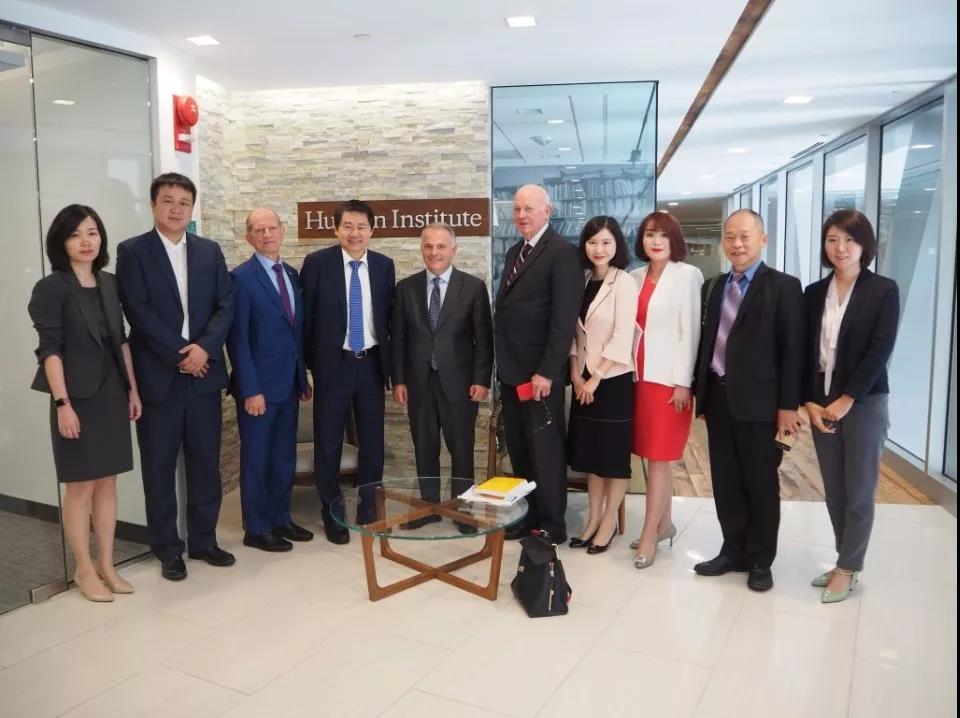
On September 26, along with leading conservative think the Hudson Institute, CCG co-hosted a symposium titled “40 Years of Sino-US relations: Past, Present, Future and Policy Recommendations.”
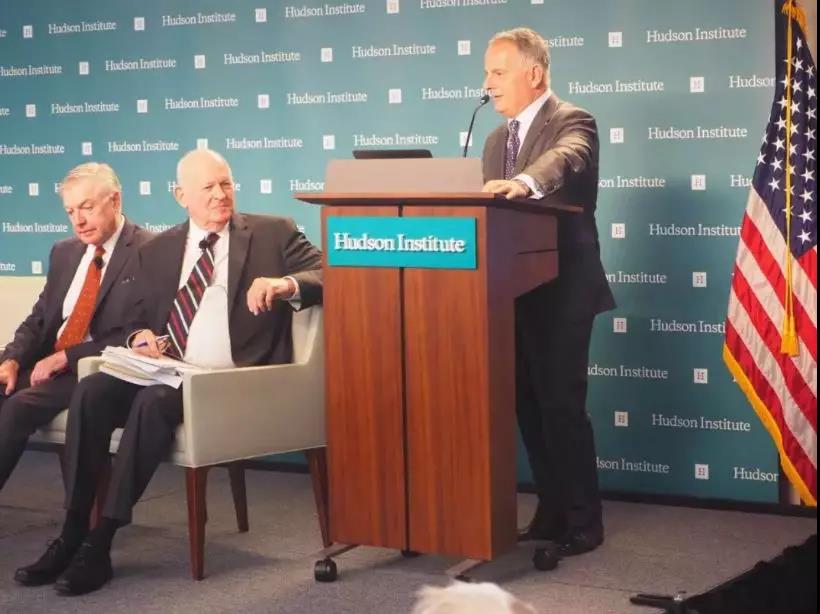
Kenneth R. Weinstein, Hudson CEO
In his opening remarks, Hudson CEO Kenneth R. Weinstein said that the US hoped for a more open China, for both sides to strengthen mutual understanding and the find resolutions to the current trade dispute.
At the symposium, CCG President Wang Huiyao and CCG Vice President Miao Lu presented CCG’s new report China-US Trade Relations and Challenges: Past, Present, Future and Policy Options. Based on CCG’s ongoing in-depth research into China’s economic development and relations with the US, this report traces the evolution of Sino-US ties over the last four decades, highlighting the significant benefits that both sides have derived from increasing economic cooperation. The report also analyses the factors that have shaped the dispute over recent months and the potential impacts of a trade war, based on a three scenario framework. This event marked the first time that a Chinese think tank had released research findings on the Sino-US economic relationship at a leading conservative think tank.

The symposium and launch of the report attracted nearly 100 officials and experts from the US government, leading think tanks, the Chinese Embassy to the US, and representatives of business and international media. Leading experts in relevant fields such as Sino-US relations, trade, and IPR participated in a lively discussion and exchange of ideas. This included Curtis Ellis, senior policy adviser with America First Policies and former executive director of the American Jobs Alliance; Ambassador Husain Haqqani, former ambassador of Pakistan to the US and Senior Fellow and Director, South and Central Asia, Hudson Institute; Arthur Herman, Senior Fellow at the Hudson Institute; Aparna Pande, Research Fellow and Director, Initiative on the Future of India and South Asia, Hudson Institute; Richard Weitz, Senior Fellow and Director of the Center for Political-Military Analysis at Hudson Institute; and Deng Xiwei, CCG Non-Resident Senior Fellow and Professor at the University of International Business and Economics.
Following the event, the CCG delegation continued discussions on Sino-US economic relations and prospects for cooperation over lunch with counterparts from Hudson Institute and US officials.
Event 6: Visit to the Chinese embassy to the US
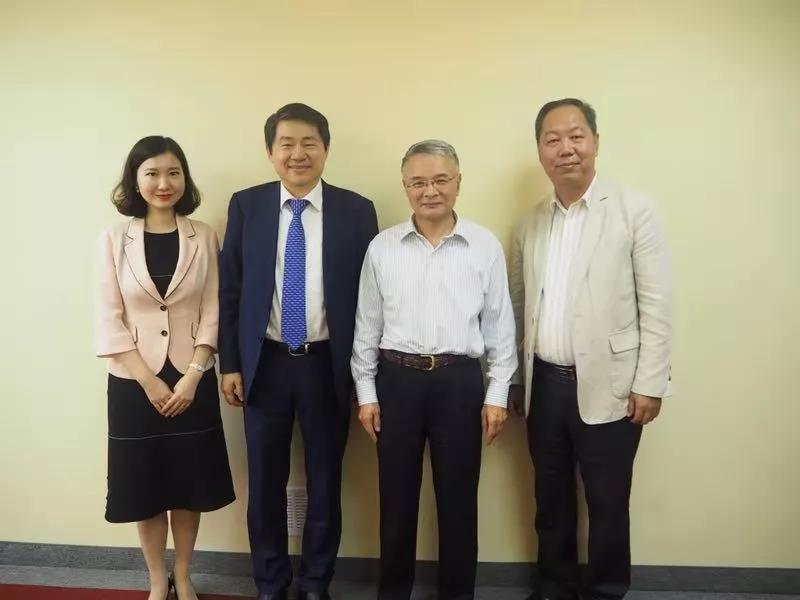
On September 26, CCG visited the Chinese Embassy to the US, sharing research findings and updates on CCG Track II engagement with officials including Commercial Minister Counselor Tian Deyou. In addition, CCG President Wang Huiyao shared key findings from the new report China-US Trade Relations and Challenges: Past, Present, Future and Policy Options.
Event 7: Visit to the office of Senator Ted Cruz
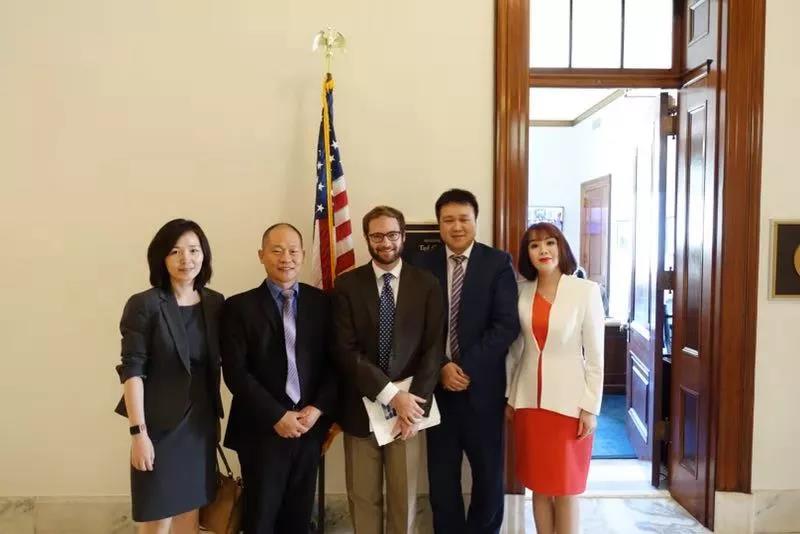
On the afternoon of September 26, CCG visited the office of Texas Senator Ted Cruz, a key figure in the Republican party. Talks with his advisor for Asian affairs, Michael Bosolik, focused on the recent escalation of the trade war, key concerns, and potential resolutions. CCG experts outlined key points and recommendations from CCG’s recent report China-US Trade Relations and Challenges: Past, Present, Future and Policy Options. Bosolik relayed that Senator Ted Cruz is committed to free trade and emphasized the strong business links between Texas and China. He also recognized the value of interaction with Chinese think tanks such as CCG.
Event Eight: Participating in a joint seminar held by CSIS, AmCham China, and AmCham Shanghai
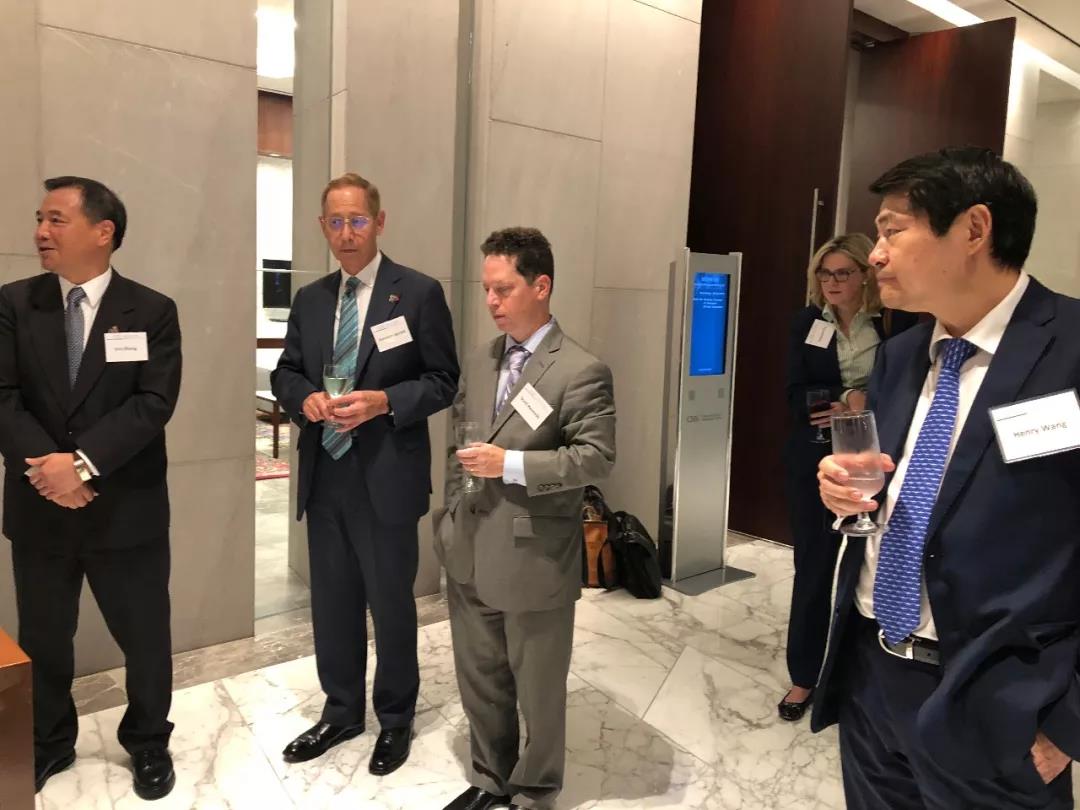
On the evening of September 26, CCG took part in an evening reception and seminar hosted by CSIS, AmCham China, and AmCham Shanghai. This came at the invitation of CSIS, continuing the cooperation with this institution based previous joint events.
Event 9: CCG visits Johns Hopkins University SAIS Edwin O. Reischauer Center for East Asian Studies
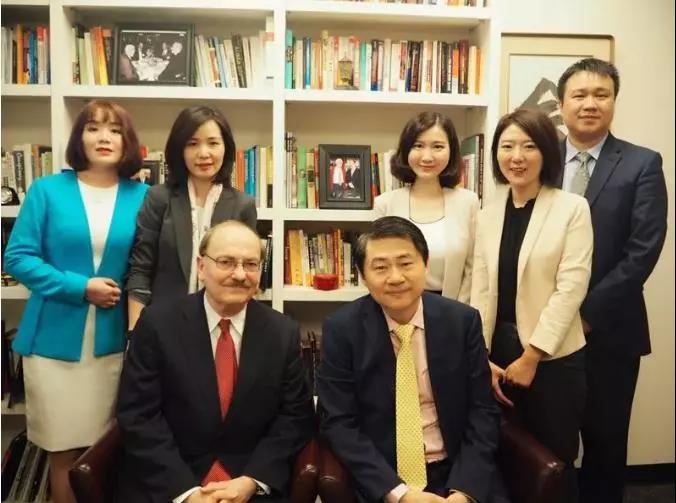
On September 27, CCG also visited Johns Hopkins University to meet with Kent Calder, former US ambassador to Japan and director of the Edwin O. Reischauer Center for East Asian Studies at John Hopkins SAIS. Calder is an influential expert in the political economy of East Asia, with many years of experience in the region and former teaching positions at Princeton and Harvard.
Event 10: In-depth exchange with the US-China Business Council (USCBC)
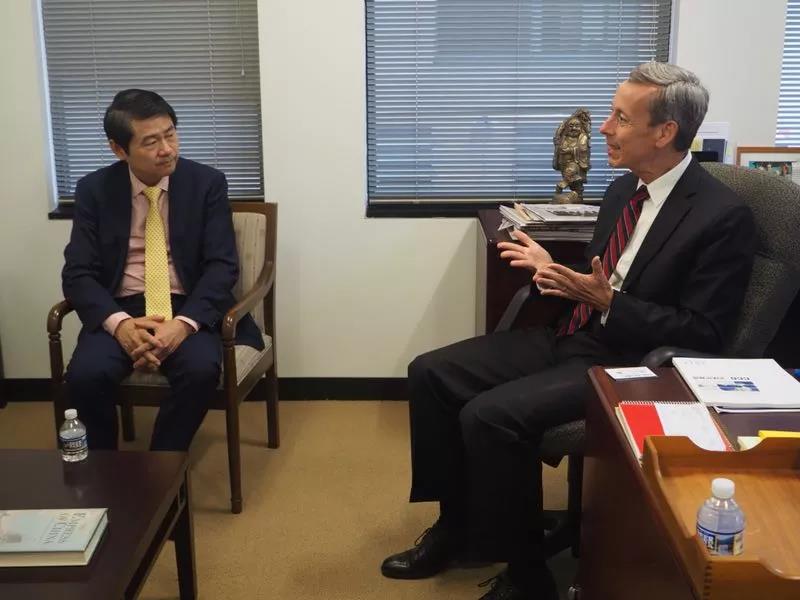
At USCBC, the CCG delegation met with Craig Allen, USCBC president and former US minister-counselor for commercial affairs in Beijing, to discuss a range of topics including Sino-US relations, bilateral economic cooperation, working with US multinationals in China, and WTO reform. USCBC is an influential group of over 200 major US firms with interests in China that has been working to promote healthy bilateral economic relations by engaging with US and Chinese government officials. Days earlier on September 25, USCBC met with Chinese State Councilor and Foreign Minister Wang Yi.
Event 11: Special CCG luncheon for CCG hosted by The Heritage Foundation
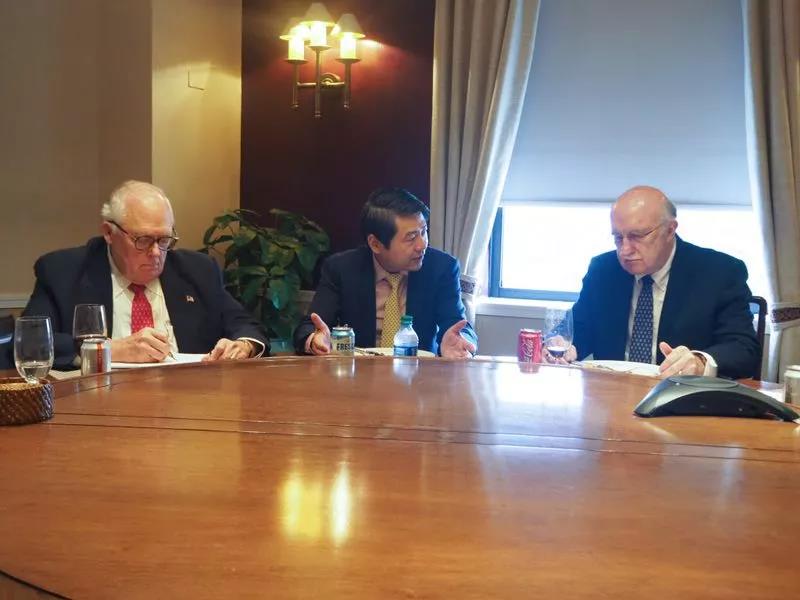
On September 27, CCG took part in a lunch meeting with leading conservative think tank The Heritage Foundation, engaging in discussions on Sino-US economic relations and potential opportunities to expand bilateral cooperation. Attendees included Dr. Edwin J. Feulner, Heritage Foundation founder; Ambassador Terry Miller, former US Ambassador to the UN and Director of Heritage Foundation Center for International Trade and Economics; Walter Lohman, director of The Heritage Foundation’s Asian Studies Center; and Patrick Tyrrell, research coordinator in The Heritage Foundation’s Center for International Trade and Economics.
The Heritage Foundation is one of the leading US conservative think tanks, with considerable influence with many groups, in particular with key Trump-voting constituencies. It boasts hundreds of thousands of members across the US and has provided over 70 senior officials for the Trump administration.
Event 12: Dialogue with Democrat Congressman Rick Larsen
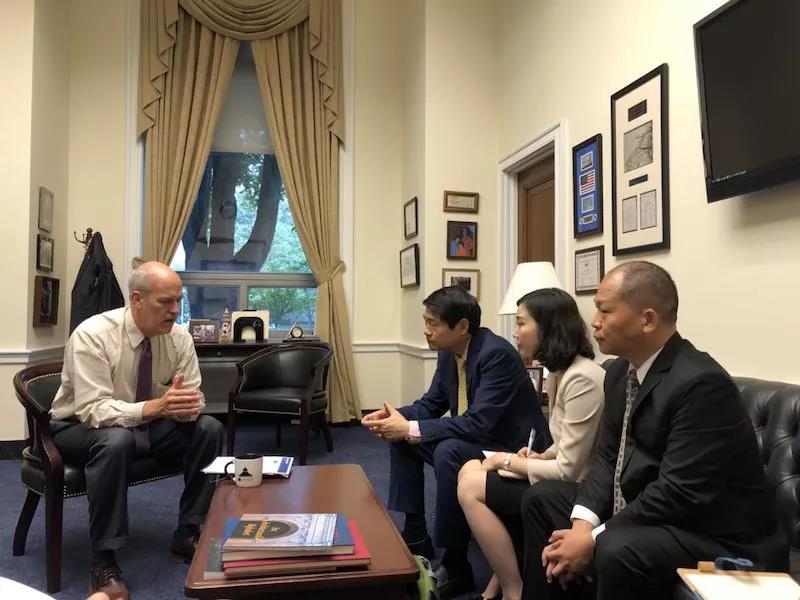
CCG discussed Sino-US trade frictions, impacts, and avenues for cooperation with Democrat Congressman Rick Larsen, co-chair of the US-China Working Group. This group aims to build diplomatic relations with China and educate Members of Congress through meetings and briefings with business, academic and political leaders from the U.S. and China. Larsen also serves on the House Transportation and Infrastructure Committee and House Armed Services Committee.
Event 13: CCG visits the US State Department

Following this, CCG made a visit to the US Department of State, meeting with officials to exchange views and suggestions on the trade dispute. This included Lisa Heller, Director of the Office of Public Diplomacy at the Bureau of East Asian and Pacific Affairs; Hanscom Smith, Director of the Office of Chinese & Mongolian Affairs and former US consul general in Shanghai; Bon Fleming, Economic Unit Deputy Chief, Office of Chinese and Mongolian Affairs.
Event 14: Visit to the National Committee on US-China Relations (NCUSCR)

On September 28, CCG visited NCUSCR to hold discussions with experts including NCUSR President Steve Orlins. An important platform for bilateral dialogue on public policy, NCUSR has long worked to deepen US-China understanding and cooperation and was instrumental in facilitating “ping-pong diplomacy” in 1972.
Event 15: CCG participates in joint-seminar hosted by NUCSR and AmCham Shanghai
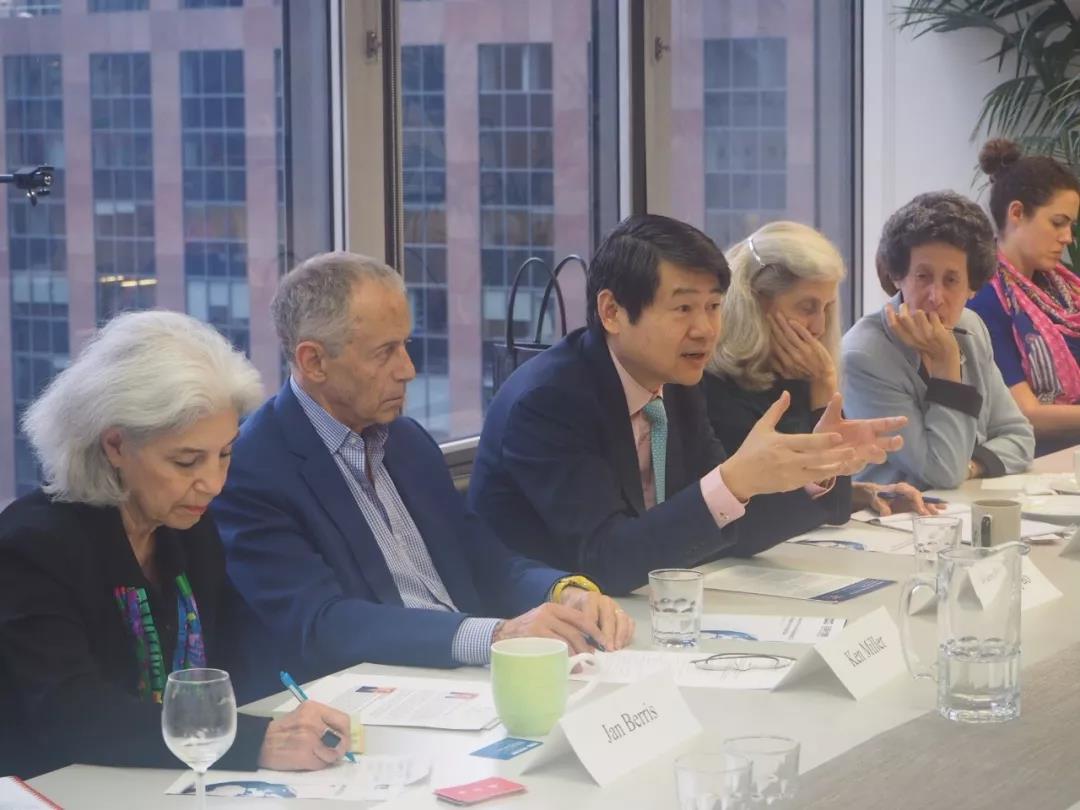
Following this, CCG attended a seminar entitled “US-China Trade Dispute: The View from Shanghai” hosted by NUCSR and the visiting American Chamber of Commerce Shanghai (AmCham Shanghai). Participants discussed the new AmCham Shanghai report outlining views of US enterprises in China towards trade policy and CCG’s new report on policy recommendations to resolve the dispute. Key speakers included Eric Zheng, chairman of AmCham Shanghai, and Kenneth Jarret, the organization’s president.
This seminar brought together leading experts and senior representatives from multinationals from a range of industries such as finance, aviation, real estate, chemicals, and consulting. This included NCUSCR Vice President Jan Berris; Peggy Blumenthal, senior advisor for the Institute of International Education, Kristen Borowiec of American International Group; Niclas Ericsson representing United Airlines; Ken Miller, CEO of Ken Miller Capital; Yoke Loon Lim, Greater China president of Dow Chemical Company; Cameron Johnson, Asia general manager of Sigmatex; and Dan Whitaker, China general manager of Consilio.
Event 16: Evening reception with Committee of 100 in New York
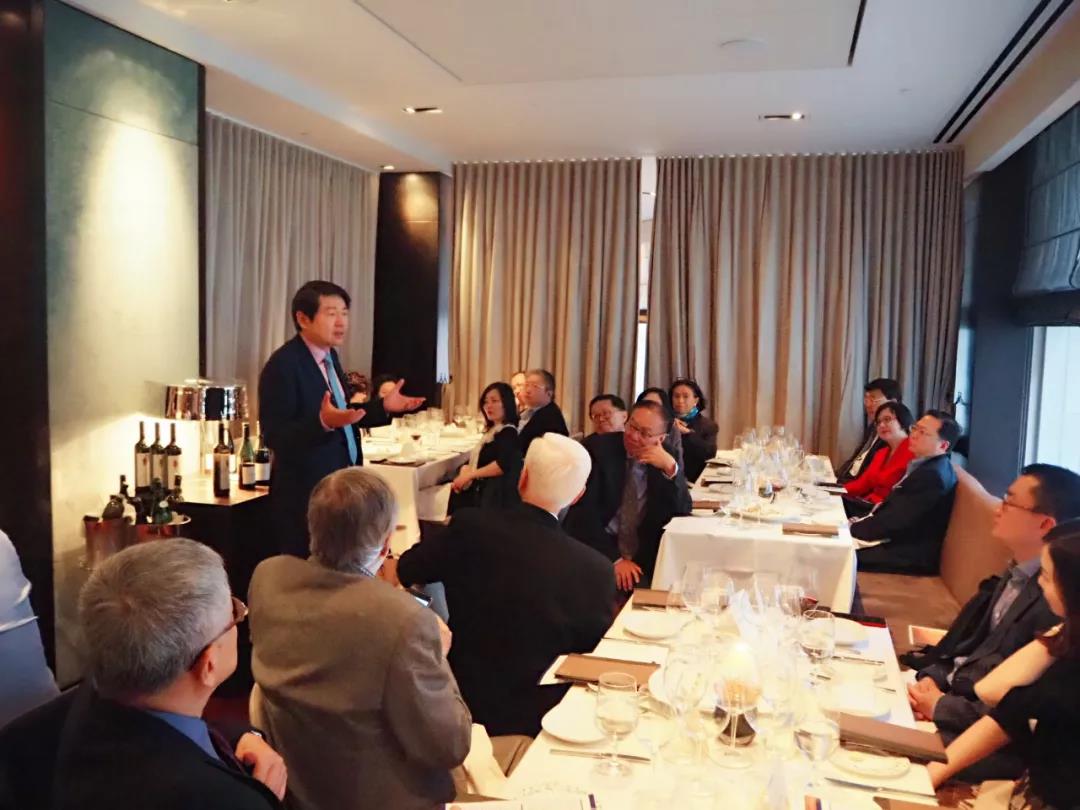
On the evening of September 28, the CCG delegation attended a special dinner reception put on for CCG by the Committee of 100, an organization of Chinese American luminaries whose founders include I.M Pei and Yoyo Ma. The organization works to promote US-China ties and its membership is handpicked from influential leaders in business, politics, academia and the arts. The reception was hosted by Howard Li, co-chairman of the Committee of 100 Greater China Area and X. Rick Niu, president of the Committee of 100 New York branch.
Event 17: Visit to UN HQ
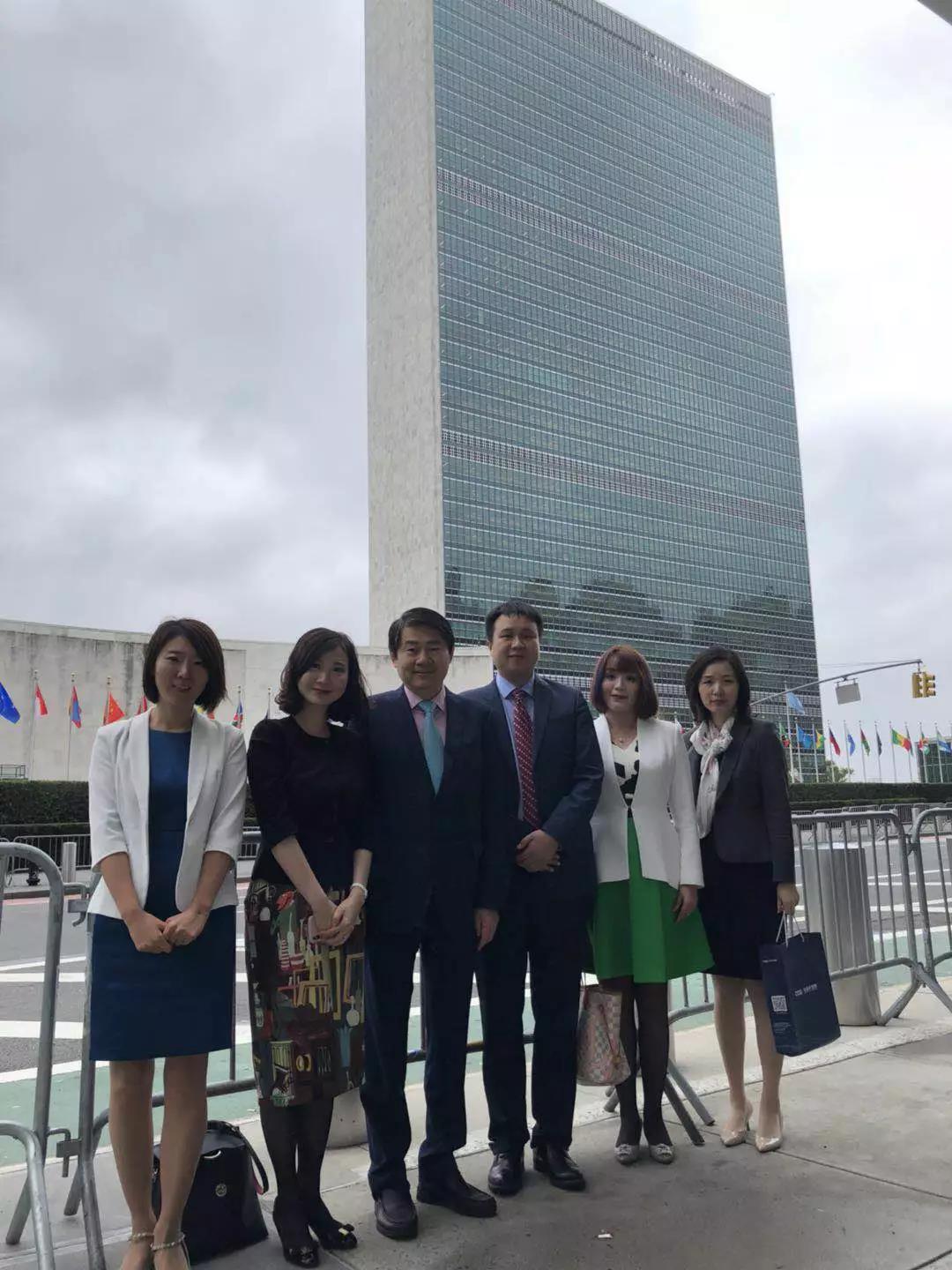
On the last stop of its US visit, the CCG delegation visited UN headquarters during the UN general assembly. In August 2018, CCG was granted Special Consultative Status with the UN Economic and Social Council (ECOSOC), the only Chinese think tank to have acquired this status.
====
This series of activities set a new milestone for Track II diplomacy work by an independent Chinese think tank. Based on CCG’s ongoing research into China-US relations, this trip succeeded in engaging with several key institutions that influence the Trump administration and helped build foundations for long-term cooperation. Coming at a critical time for the China-US economic relationship, CCG’s outreach gained recognition from the Chinese and US policymaking community, media and academics.
To help resolve the current China-US trade dispute, CCG actively strives to leverage its position as an independent think tank to strengthen channels of international dialogue with government, industry, and academia, engaging with top think tanks, Congress, state governments, industry associations and key multinationals.

